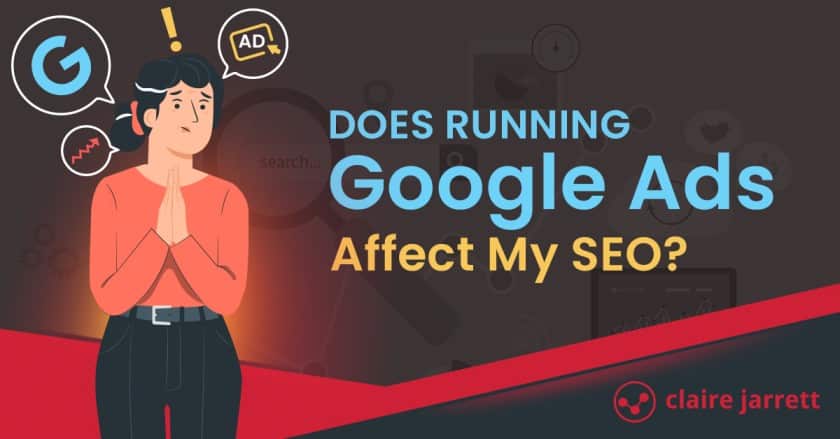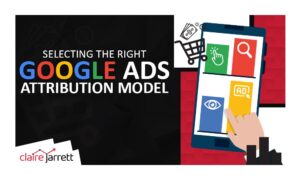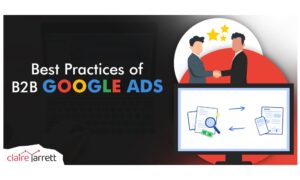Does Running Google Ads Affect My SEO?

Last Updated on: 28th April 2024, 12:03 pm
Every marketer who has ever considered running Google ads has asked themselves this question: Does Running Google Ads Affect My SEO?
The issue has been a fiercely debated one, and you’ll likely encounter two advertising camps (so to say), both armed with strong points in their favour.
However: no, running Google Ads doesn’t boost your SEO.
Numerous advertisers see their organic results improve after they start spending more in Google Ads. However, this is not because Google likes people who spend money on PPC.
It’s likely because more people know about you now.
In this article, I’m going to explain everything you need to know about using Google Ads to your advantage (even if your organic SEO results are incredible).
Let’s get started!
Do Google Ads Affect SEO?
No, Google Ads do not directly affect SEO. Google has repeatedly said that SEO is not a pay-to-play model. You won’t be able to improve your rankings by advertising with Google Ads.
But even if you can’t improve your organic search rankings with advertising, you can still use Google Ads to boost your SEO strategy indirectly.
Google Ads appear at the top of the search results, so people who conduct a Google search see your ads first. You can also offer strategic information in your ads, such as relevant Google Ads sitelinks, lead form extensions, and so on. It strengthens brand recall and increases the likelihood of getting direct searches to your domain later on (people explicitly searching for your business name).
This is an incredible asset for business owners. If you make your SEO and PPC work together, you’ll have a viable strategy to generate even more revenue in the long (and in the short) term.
How to Boost Your SEO Strategy with PPC
More SERP Real Estate
But let’s imagine your lead scrolls down because they want to see more options. After seeing your ad placed prominently in the SERPs, they’ll then see your organic pages (if you optimised properly).
This results in Google Ads helping you occupy more real estate in search engine results pages. Users who skip past the ads and go straight to the organic search results will also see your business listing here.
By using PPC in conjunction with SEO, you’ll be exposing your business to users twice. This strategy will maximise the chances that users will click one of your business’ listings and visit the website to learn more.
How many times have you looked at a page of search results and clicked on a particular business’s website just because you saw it multiple times in the results and assumed it offered reputable services?
Additionally, seeing your results more often in the SERPs increases the perceived trust, which is crucial for YMYL services like accounting.
Mixing SEO and PPC is an extremely valuable strategy because it encourages users to engage with your business and ultimately drives more traffic to your site.
Personalisation
One of the key benefits of running Google Ads (even if you’re a SEO pro who’s ranking in the first spot) is that you choose what your leads see.
Google has its own criteria for deciding which pages it will display to leads in the standard search engine experience. This can sometimes mean outdated landing pages, content that’s not exactly optimised for conversion, and so on.
When you run Google Ads, on the other hand, you’re able to tailor your offer to the type of leads you are hoping to attract. You can send them to newest landing pages, offer them special perks, and more.
Consider this example from Monday.com. The first image is their paid ad, and the second is the page that Google serves for the “Monday.com for construction” query. Can you spot the difference?
The organic page can only entice the visitor with the meta description, something that Google often generates on its own.
On the other hand, the paid ad offers more reasons to actually purchase Monday.com – including templates, enhanced team collaboration, pricing, integrations, and more!
Discover Valuable Keywords
Google Ads help you discover more valuable keywords for organic SEO.
Targeting the right keywords is a vital part of both your SEO and PPC strategies.
But SEO takes time to show results (months or even years in some cases), so it can be challenging to gauge your keyword strategy’s effectiveness as soon as you get started.
PPC, on the other hand, allows you to see keyword results immediately. Give it a day, and you’ll be able to see which keywords drive conversions, visits, and quality leads.
Knowing that, you can easily start optimising your other pages for those keywords so you can rank organically.
By implementing the knowledge you gather from your PPC campaigns into your SEO campaigns, you will be able to understand exactly what your customers want and the keywords they are using to land on your website.
Increase Brand Awareness
By implementing Google Ads for your business, you drive clicks to your website. When a user clicks on an ad, they visit your website and learn more about your business.
This doesn’t always happen, because some people get distracted and bounce immediately after clicking on an ad, but as a rule of thumb, users can gain awareness of your brand via Google Ads.
Even if they don’t make a query or a purchase immediately, they will likely remember your business when they search for similar products and services in the future. As a result, they will be more likely to click on your organic listings over those of your competitors because they already know you.
Ultimately, running Google Ads can help you build brand awareness that can result in more organic traffic in the long run. Just check your GA4 traffic sources for any direct traffic spikes!
Reach Local Leads
Google Ads can help you reach more local leads. If you offer your services or sell your products in a specific area, Google Ads can help you optimise for that area in particular, something that’s a bit harder to do with organic listings.
People who conduct a local search will see your ad first, and since most users are using mobile devices, PPC ads are likely to fill out the majority of the screen. As a result, using Google Ads will help you draw immediate attention to your business.
On mobile devices, PPC ads are followed by Google My Business listings, so even if users see your PPC ad and decide to skip it, they’ll be likely to scroll down further and stumble upon your Google My Business listing.
If they ignore that too, they may find your company’s website further down in the organic results.
By implementing PPC ads and making sure your company is listed with Google My Business, you create a triple exposure, which will show leads that your business can offer them exactly what they need.
Wherever they look for their target query, they’ll see your business. Not only does this show that your business is reputable, but it also instills trusts and ensures leads remember you.
PR Benefits of Google Ads and SEO
In addition to the points I’ve listed above, this phenomenal tandem can also have other effects on your brand.
For example, your lead clicks on your ad and visits your website. If they’re highly interested, they’ll likely click through your pages, read your blog, and perhaps even share your offer with their social media network.
If you remember the buzz about Google’s link-less future a few years ago, you might remember that Google has decided to start “listening” to what your leads say about you on social media. So by using both Google Ads and regular organic content, you’ll be able to generate more traction.
If it’s positive, that can indirectly affect your ratings (positively, of course).
So while you are focusing on commercial content with your Google Ads, you can optimise your helpful and informational content for organic SEO benefits. Knowing what your profitable keywords are, it will be much easier to get great results without having to wait a few months.
Quick Tips for Using Google Ads and SEO in Tandem
-
Analyse and Learn from Your CTR
By reviewing the click-through-rates for the ads you’re running, you can tailor the copy on your website to your customer’s needs. Dividing the ad clicks by the total number of impressions gives you the click-through-rate, which is typically considered the go-to metric when it comes to determining ad relevance.
Reviewing click-through-rates can help you determine which of the ads you’re running are yielding the highest return. Based on this information, you can write copy that actually answers questions and problems for users.
P.S. Don’t forget: relevant ads = reduced cost per click. Google likes it when you provide useful information to its searchers!
-
Optimise Your Content for Relevant Keywords
Successful Google Ads campaigns depend on choosing relevant keywords to drive traffic to your website. Once you have determined which keywords performed well for your ads, you can use variations of them and target long-tail keywords to improve your organic search rankings over time.
P.S. Long-tail keywords can help you improve your SEO results, especially when you’ve recently started your efforts. In the beginning, use long-tail keywords for SEO, and target commercial keywords with your Google Ads.
-
Eliminate Irrelevant Keywords
Your SEO efforts shouldn’t be just about finding and using the best keywords for your content — they should be about eliminating low-performance keywords as well.
Once you begin to accrue information about the keywords that perform best for your ad campaigns, you’ll also notice that some keywords don’t attract new visitors. Add them to your negative keywords list so you can only focus on keywords that produce results for your brand.
(In some cases, that might even mean bidding on your competitors’ names in Google Ads.)
P.S. Keep in mind that Google is changing a few things so you might not be able to see negative keywords that attracted just a few views.
-
Write Compelling Ad Copy
Pay attention to your website content, and track how it affects your conversions. Don’t be afraid to analyse your current results and change things, especially when it comes to landing pages and ads.
P.S. Not sure where to get started? These are my top tips for writing amazing Google Ads copy.
-
Focus on Your Geographical Performance
By analysing your geographic performance in AdWords, you’ll be able to determine which areas of the country (or the world) drive the most sales or signups. You can also see if one geographical area is particularly fond of clicking on your ads.
With this data in hand, you can then use Google Trends to see what kinds of phrases users are looking for in those particular locations and which phrases are shrinking in popularity at the same time. This information can help you fine-tune your keyword strategy and improve your on-page SEO.
6. Test Messaging and Offers
Let’s say you’re an e-commerce store selling fitness supplies. You create two different ad copies for your running shoes. In Google Ads, you run these two ad copies simultaneously and monitor their CTR and conversions, only to find that ad copy B performs better.
Knowing that this resonates more with the searcher, you can use this insight for your SEO strategy. Using the winning ad copy, you create a blog post around the theme of optimising running performance. The post highlights the benefits of your shoes and provides running tips.
And by using this ad copy, you’re creating consistency in your messaging, so there is an “A-Ha!” moment when the lead sees you in the organic results (or vice versa).
Just make sure that the different Google Ads Responsive Search Ad variants all match!
Match Made in Heaven?
To sum it up, there are numerous benefits of using both SEO and PPC:
- Integrate keyword information from PPC into your organic search strategies and optimise for the right keywords
- Test your keyword research strategy in PPC before committing to an SEO campaign
- Use the results from testing ad copy to improve your organic content and landing pages
- Finally, by combining organic and paid visibility, you can increase brand awareness
This comprehensive approach makes it easier to drive conversions. It also makes for a really good strategy that will steadily attract new visitors to your website. SEO offers long-term traffic, while Google Ads makes sure that your leads are targeted and ready to convert.
So if you’re ready to get started with Google Ads, get in touch with me. Let’s create a fantastic strategy for your business! In the meantime, why not check out my brand new for 2022 Google Ads book?







